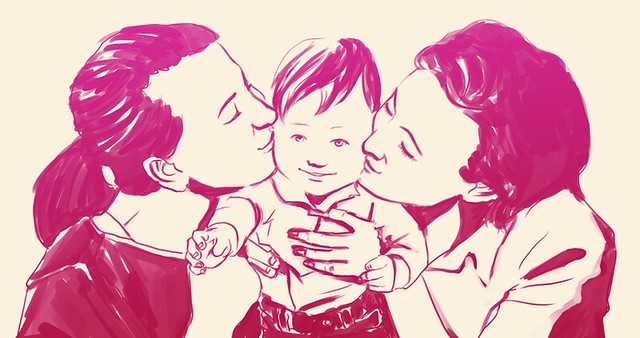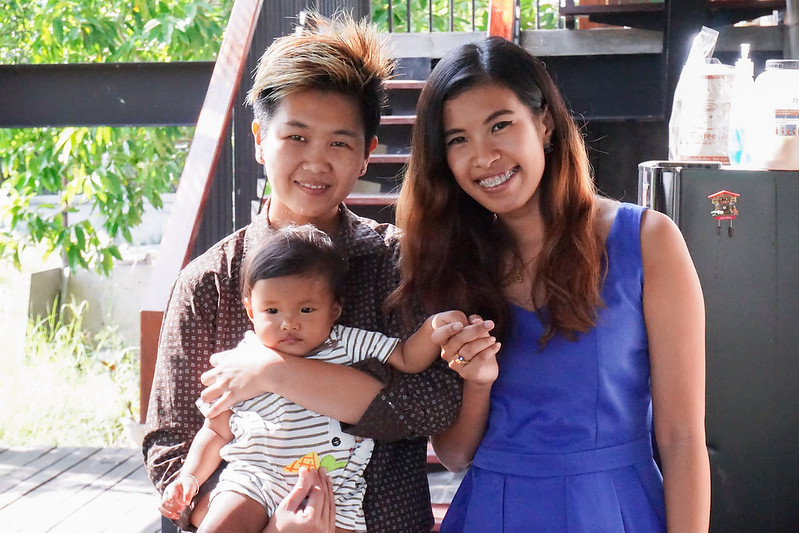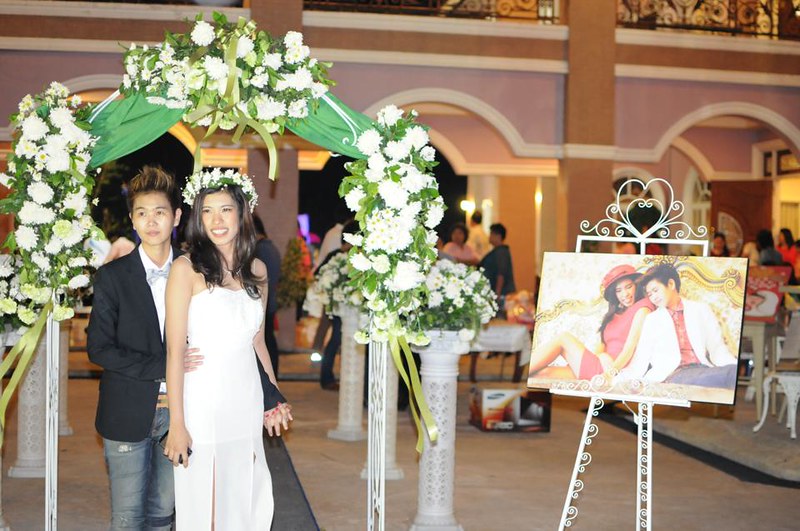With no people’s representatives in parliament, the junta has attempted to pass several quick bills without people’s participation. Among them are three controversial gender-related bills, opposed by women and LGBT rights groups. Following bills on
Civil Partnerships and
Gender Equality (see Prachatai’s reports on these), the junta is aiming to pass another bill.
But this again could violate the rights of lesbian, gay, bisexual and transgender (LGBT) people, and even opposite-sex couple who do not have their marriage registered, by banning them from having children by surrogacy technology. The bill is the Protection of Children Born from Medically Assisted Reproduction Technology Bill.
If the surrogacy bill is passed, same-sex couples will be excluded from using the technology
If the bill is passed, it will outlaw commercial surrogacy in Thailand and also outlaw surrogacy involving same-sex couples and unregistered opposite-sex couples. The bill also bans the advertisement of surrogacy services and prohibits middlemen from taking fees for providing surrogate mothers.
The bill is seen as an attempt to regulate surrogacy after the notorious
Gammy Case. An Australian same-sex couple paid for surrogacy in Thailand but later abandoned one of two babies born, after he was found to have Down’s syndrome. The surrogate mother has been left with the burden of raising the baby.
According to a BBC
report, commercial surrogacy is legal in a few countries including some US states, India, Russia and Ukraine. However, countries such as France, Germany, Italy, Spain, Portugal and Bulgaria do not allow any form of surrogacy.
Thailand has been one of the famous destinations for foreigners seeking surrogacy services because the country has no regulations governing commercial surrogacy. However, because of this, the authorities cannot protect mothers and children, such as Gammy and his surrogate mother, from being victimized in commercial surrogacy cases.
What Thailand currently has is
Article 1546 of the Civil and Commercial Code which stipulates that a woman who gives birth to a child is the legitimate mother. Therefore, according to a report from
iLaw, the intended parents of children born from assisted reproduction technology cannot be the legal parents. In fact, the woman who carries the child to term must be the child’s legal mother.
The new bill, proposed by the military junta, protects surrogate mothers and their babies from this. Article 27 of the bill states that the intended parents of a child born from assisted reproduction technology, including surrogacy and in vitro fertilization (IVF), can also be the child’s legal parents. Article 23 also prohibits the use of assisted reproduction technology for commercial reasons.
The bill seems to recognize a need for surrogacy and IVF only for heterosexual couples. Articles 19 and 21 (1) state that those intended to be the parents of a child born by this technology must be in a legal relationship as “lawful husband and wife”. The bill rules out the right of singles and LGBT couples to have children by this technology, since it applies only to heterosexual couples with legally registered marriages.
Moreover, Article 21 (3) stipulates that a woman who wishes to be a surrogate mother must have already given birth, and if she has a husband, her husband must give prior consent.
According to Foundation for SOGI Rights and Justice (FOR SOGI), a LGBT organization in Thailand, this clause excludes lesbian couples who wish to have a child by sperm donation.
Sukrittaya Jukping of the College of Interdisciplinary Studies, Thammasat University, thinks that many LGBT couples should enjoy the same right to have children as heterosexual couples, because she does not believe that a family must necessarily comprise one male father and one female mother. However she thinks that Thai society is still not ready to accept new types of family because of the conventional idea that children raised by same-sex couples will be negatively affected.
“For example, some people still say that the children of gay couples will be sexually abused [by the couple]. However, this has been proved untrue by foreign
research,” said Sukrittaya.
Because of this misconception, Sukrittaya explained, Thai society is still not able to accept same-sex couples having children. “This is an absolute violation of human rights,” she said.
She also conducted her own research on LGBT parenting in Thailand in 2012. In her research, she found that the legalization or regulation of LGBT people having children will have more impact on Thai society than same-sex marriage itself, because the process will affect the conventional family structure of Thai society.
Same-sex couples who have children but do not have any problems, normally assign to each of them the roles of mother and father, so that the “conventional family structure” is not destroyed. These families normally do not have two mothers or two fathers in Thailand.
Prachatai conducted an exclusive interview with a lesbian-tomboy couple who actually experienced this “medical technology” to have their own baby. This will be considered illegal if the bill is passed.
++++
Wongkot Tangchitwatthanakul and Ouanpa Pankun used IVF technology to have a baby, Wongprachun Tangchitwatthanakul, eight months ago. They now live in Tak Fa District in Nakhon Sawan. Photo by Takato Mitsunaga
Living with a partner can bring you happiness. Having children can give you even more happiness. If you have a big family, you’ll get the greatest happiness.
Nakhon Sawan — Driving the family car, a sort of microbus, along small lanes between green fields, Ouanpa Pankun, 32, talked about why she drives this extremely big car.
“I have a very big family now,” said Ouanpa who has been with her tomboy partner, Wongkot Tangchitwatthanakul, also 32, for over two years, and now has an eight-month-old baby.
Ouanpa moved to Nakhon Sawan to stay with Wongkot and her family after they held a wedding ceremony on February, 2013. She gave birth to a baby in February 2014, named Wongprachun Tangchitwatthanakul (Lawa), using sperm donated by Wongkot’s younger brother.
Wongkot Tangchitwatthanakul and Ouanpa Pankun’s wedding on February 28, 2013. Photo Courtesy of Ouanpa Pankun
It’s no wonder the big car is useful when the entire family goes on a trip.
Ouanpa parked the car right next to a chicken farm where “her family” runs a business. Ouanpa helps the chicken farm business using her skills as a veterinarian.
She graduated from veterinary school and was working for a pharmaceutical company. After a while, in 2012, she first met Wongkot. Since Wongkot was working for the farm owned by the family, Ouanpa felt a sort of sympathy. This made their relationship even stronger.
“It was very fast,” said Ouanpa, laughed. “It didn’t take long to fall in love with Wongkot.”
Sitting in their dining room, Ouanpa welcomed her partner who came through a glass door out of a room where Lawa was sleeping peacefully. Wongkot carefully took the eight-month baby in her arms so as not to wake her up. Once Ouanpa tried to hold Lawa, she started sobbing.
Ouanpa said that Wongkot mainly takes care of the baby. Lawa herself is calmer when she’s in Wongkot’s arms.
The couple started thinking about having a baby since the very beginning of their relationship. After they had begun their new life in Nakhon Sawan in late 2012, Wongkot’s mother suggested that the couple should have a baby. “My mother also wanted a grandchild. She said that she wouldn’t even know how to spend her money without one,” Wongkot said.
Since Wongkot was not biologically able to create sperm for her partner, they used sperm offered by Wongkot’s younger brother along with Ouanpa’s egg. “At least my child would have a blood relationship with me and Ouanpa, even though I’m not the sperm donor,” Wongkot said.
However, the pregnancy didn’t go easily. A gynaecologist at first refused their request to have a baby without using sperm from Ouanpa’s legal husband—which Ouanpa had never had. The doctor was concerned about the baby’s future without a so-called “father”.
“First, the doctor told us that it’s ethically wrong,” said Ouanpa. “However, looking through the information in my medical records, including my occupation as a veterinarian, and talking to my family, he finally decided to do it for us,” Ouanpa said.
Ouanpa finally became pregnant at the very beginning of 2013 with the warm support of her partner and family.
Everything was going fine, and they even scheduled their wedding for February 28. But things went wrong. Ouanpa miscarried on the very day of their wedding. They were shocked, but they didn’t call off the wedding.
Even so, the couple didn’t give up their dream to have their own child.
The second chance came three months after the wedding when Ouanpa became pregnant again in May, 2013. 10 months later, Lawa was born on Feb 22, 2014. Lawa’s birth certificate registers Ouanpa as the mother and Wongkot’s brother as the father.
“I was very happy that I really did it,” said Ouanpa, recalling her precious day. “It was like, I really, really made it!”
Meanwhile, Wongkot wasn’t able to be with her partner at the hospital. She rushed there but the delivery was all over, and Lawa was already in this world. When Wongkot went to see her daughter, all the nurses were very curious about who Lawa’s father was.
“At first, the nurses thought that Ouanpa had had an affair with another man [and become pregnant],” said Wongkot. “They told me I was a very kind and patient person for not dumping her. We explained how we did it.” She laughed.
Ouanpa says that this is not the end. She wants more children. Having children definitely can bring her happiness. “I would highly recommend many people to have their own children. Having children costs a lot, but it is surely worth more than buying a car.”
However, the new bill currently drafted by the military junta will destroy the dream of lesbian, gay, bisexual and transgender (LGBT) couples of having children. The bill is called the Protection of Children Born by Medically Assisted Reproduction Technology Bill, and it imposes strict curbs on the use of assisted reproduction technology to have children.
The Foundation for SOGI Rights and Justice (FOR SOGI), a leading LGBT organization in Thailand, thinks that the bill discriminates against LGBT people who wish to have children using assisted reproduction technology, including surrogacy.
The organization held a seminar on October 2 called “Protection of Children Born by Medically Assisted Reproduction Technology Bill: Unfair Discrimination against Gender Diverse People” to increase public awareness of the bill. According to the seminar, LGBT couples will immediately be excluded from this technology, since their relationships are not legal.
This bill will make what Ouanpa and Wongkot have done illegal, since Ouanpa was never married to a man. Also, LGBT couples wishing to have children in the future won’t be able to do so. The couple attended the seminar as guest speakers with the actual experience of having a child using “medical technology”.
Ouanpa and Wongkot think that this bill strongly discriminates against gender and sexual minority people. If the bill is for the “protection of children”, why doesn’t it consider LGBT couples as capable of raising children like heterosexual couples? Is it just because the children will suffer from a situation of not having a mother or father as the gynaecologist said to the couple?
Other people also think that it is wrong for LGBT couples to raise children. After having their own child and attending the seminar, Ouanpa and Wongkot became famous in the media. Several reports were published describing the couple and Lawa. However, comments on these reports sometimes saddened and disappointed them. Some people said Lawa was miserable.
Looking at a happy, smiling Lawa, Ouanpa rejects these people’s concerns. “See? Lawa doesn’t even feel weird that she’s with two female parents,” Ouanpa said. The couple got really mad when they read the comments, and didn’t even look at them after that.
“I guess it’s because Lawa has not yet been in the outside world,” Wongkot replied. “Once Lawa goes to school, she’ll learn more. We have to tell Lawa the truth before that.”
“It’s society that sees Lawa as miserable, not us,” the tomboy said. “If I want to have a child, and if I, a tomboy, got married to a man, I could have a baby, but I might feel miserable myself. But society thinks that’s the right thing.”
“These people will never change their opinions,” she said in loud voice.
The couple also feels the eyes of people on them when they go to a department store. They said they probably think too much, but it is also true that “a tomboy holding a child and walking along with her girlfriend” could be seen as weird in other people’s eyes. It might be because the people don’t know the background.
“Our family and friends have never said anything against us, because they understand who we are,” said Wongkot. “I gave up making these other people truly understand us.”
Although the couple has never been discouraged by society’s norms from living their own life, they still worry about Lawa. However, Lawa’s innocent smile and eyes full of curiosity have the parents realize their duty.
“The important thing is we are all family,” said Wongkot, and Ouanpa nodded.
++++
Krissana Tungchitwatthanakul, Wongkot’s father, drives his car very fast on a small road. Changing gears smoothly, he has overtaken many cars already.
“My family normally drives cars very well, and we drive very fast. It usually takes only 90 minutes to get to Bangkok,” said Krissana. “I’m really happy to welcome Ouanpa to our family.”
He stopped the car for a while to explain how beautiful the land is in Nakhon Sawan. In the morning, all the green fields are covered in a white mist, and as time goes by, the view turns to a vivid green again during the day.
“Even though my daughter is tomboy, I don’t much care as long as she’s happy,” said the father, and now Lawa’s grandpa.
“No matter whether people are lesbian, gay or straight, whatever, you’re very lucky to find the one who you can spend your life with. I even feel jealous of my child for having too much happiness sometimes,” he said.
“If they have children and families, it’s more than enough. They must be very happy.”



